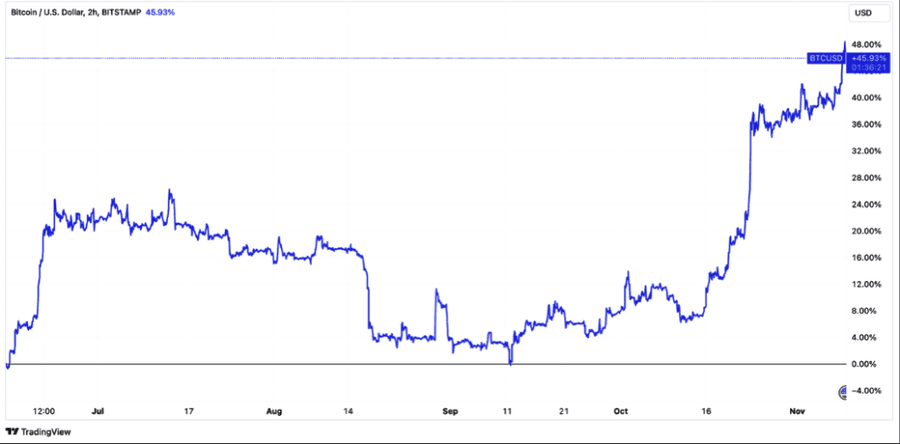Who thought Ethereum gas fees would hit triple figures? With Ethereum’s gas fees pumping like an old V6 guzzler, Vitallik Buterin should consider renaming it ‘Ether Gasoline.’ Just waiting for Elon Musk to tweet about it.
Ethereum gas fees increased from a median average of 33 to 270 Gwei as the ETF frenzy intensified. The increase in median gas fees follows Blackrock’s filing of an ETF product that will hold Ethereum and directly track the leading altcoin’s spot price.
After investors discovered the ETF application, demand for Ethereum blockspace intensified. For this reason, Ethereum surged from the $1800 support level to $2100, while network users paid nearly $100 in transaction fees.

The spike in gas fees after news of the ETF filing pushed the cost of trading Ethereum swaps between $60 – $100 for a temporary period. Ethereum recorded such a high cost of transacting on the Ethereum blockchain in June 2022.
In 2023, the highest gas fees on the blockchain were last recorded in May 2023 during the meme coin frenzy. Even then, the cost of transacting on the Ethereum blockchain did not surpass 33 Gwei. The median gas price denotes transaction fees on Ethereum as gwei. A gwei is the tiniest unit that denotes Ethereum gas fees. One billion gwei units make one ETH.
Read More: ETF Explained: Your Roadmap
BlackRock Ethereum ETF Rally: Breaking Down the Rise in Gas Fees

The surge in fees hit the Ethereum network like a stampede of crypto bulls looking for a greener candlestick after news broke that BlackRock, the financial behemoth, filed for an exchange-traded fund (ETF) holding ether (ETH).
It seems BlackRock wanted to diversify its crypto portfolio, following its bitcoin ETF filing and Ethereum got its moment in the spotlight. Prices skyrocketed by as much as 10%, gleefully crossing the $2,000 mark.
Ethereum validators, meanwhile, must be feeling like they’re at a high-stakes poker game. They’re not just choosing transactions on a first-come-first-serve basis; it’s more like they’re playing ‘Fee-roulette’ – incentivized to include transactions that pay the highest fees.
Remember, to validators, confirming transactions is not all about speed; it’s about who’s willing to pay the most to have their transactions processed quickly. If only Ethereum validators had a tip jar for those thousand-dollar fees – they could be the new high-rolling moguls of block confirmations.
Tepid Onchain Activity
“Nansen data is throwing some serious shade at on-chain activity, suggesting it’s been as tepid as yesterday’s coffee compared to the more bullish vibes of 2022. It seems like the retail audiences have been playing hide and seek, and on-chain trading is still waiting for them to shout ‘Ready or not, here I come!’
According to Nansen analyst Jake Kennis, the on-chain party is missing its regular attendees. In a Thursday message that probably had a virtual shoulder shrug attached, he said:
There is no inclination of on-chain activity increasing alongside it in terms of DAUs and newly funded addresses entering the Ethereum ecosystem.
Imagine the scenario as the blockchain throwing a party, but the retail crowd didn’t get the memo – or maybe they’re just fashionably late to the floor.
A credible explanation would be that the industry is missing the usual on-chain follow-through that comes with this level of market buzz. Perhaps onchain activity got the invitation but is still deciding whether to RSVP or post its regrets.
BlackRock Wants to Create an ETF that Holds Ethereum
Blackrock is following a similar Bitcoin Trust Setup with its spot Ethereum ETF.
Call it Deja Vu or not? The current surge in Ethereum following the filing news mirrors Bitcoin’s price rally after Blackrock announced a spot BTC ETF in June.
While Ethereum jumped by 10%, Bitcoin surged by 20%. As such, Blackrock has confirmed to investors that an asset manager with its reputation cannot file an ETF product without expectations of success. Nevertheless, it bears mentioning that the Securities and Exchange Commission (SEC) has not yet approved a spot crypto application to date.
Despite the massive enthusiasm and positive market reaction to spot crypto applications, the process has been a challenging one. In fact, Bitcoin plummeted downwards from its June rally ($30K – $23K) before pumping upwards again in October.

BlackRock Registers New Corporate Entity in Delaware – Signaling a SEC Filing
Reports of BlackRock registering a new corporate entity in Delaware surfaced 3-days ago, with investors interpreting the move as a step towards an upcoming SEC filing.
The new corporate entity is an Ethereum Trust and signals an incoming SEC filing because BlackRock first registered a Bitcoin Trust before filing with the SEC.
According to a retweet by senior ETF analyst at Bloomberg, Eric Balchunas, BlackRock registered the trust entity with the state’s Division of Corporations and named Daniel Schweiger as an agent. As per the announcement, the new entity will be called iShares Ethereum Trust. After checking the named agent’s Linkedin profile, we found Schweiger is a BlackRock managing director.
“So what’s next for BlackRock and its Ethereum Trust?”
The next step for Ethereum is receiving all the ‘trust fund’ love that Bitcoin has been getting.
Just kidding!
Now everyone is eagerly waiting for the SEC to finally give its official stamp of approval. If you thought building trust was a walk in the park, think again.
Think of it like dating. First, you register a new entity, retweet the news and everyone you know is excited about you (of course, not everyone is happy for you.) After the market gets excited, the SEC evaluates whether it is a nice date and says “I DO’ If not upto par, the commission proposes changes, and ETF works on the changes and returns with a “Trust me now”.
Hopefully, the SEC will trust the ETF this time!
Read More: Vitalik Buterin Transfers 400 ETH Valued at $600,000 to Coinbase
Possible SEC objections to the surveillance-sharing aspect
Surveillance-sharing aspect is a vital component in the race to launch a spot crypto ETF. Presently, BlackRock, Fidelity Investments, Valkyrie, ARK Investments Management and WisdomTree are among those racing to become the first to launch a Bitcoin ETF product. As such, the surveillance-sharing aspect performs a vital role in ensuring the process is transparent and trustworthy.
In crypto ETFs filings, a surveillance-sharing agreement involves agreements between crypto exchange regulators and market surveillance providers. The role of these agreements is to enhance transparency in crypto marketing, especially in the way that data and information are shared. Given the decentralized features of crypto investments and trading, it becomes instrumental for regulators to address concerns such as insider trading and market manipulation. A surveillance-sharing agreement ensures that trading providers are sharing crucial market data with surveillance/regulatory bodies. Such data include order book details. The data ensures regulatory bodies can monitor irregularities and uncompliant trading practices.
Possible Objects to the BlackRock Filed Paperwork for an ETH ETF Product
The SEC might raise objections to the surveillance-sharing aspect in the filing of a spot ETH ETF for various reasons.
One potential concern could be the complexity and volatility of the ETH price action. Unlike traditional securities, the cryptocurrency market is relatively new and can be more susceptible to rapid price fluctuations and market manipulation.
Additionally, the SEC might question the effectiveness of surveillance-sharing agreements in addressing these challenges, especially given the decentralized and pseudonymous nature of blockchain transactions. Ensuring the integrity of market data and the ability to detect and prevent illicit activities in a digital asset like Ethereum may pose challenges that differ from traditional financial instruments.
Furthermore, the SEC may seek assurances regarding the reliability and independence of the surveillance providers involved in the agreement. There could be concerns about potential conflicts of interest or the adequacy of resources dedicated to monitoring a complex and dynamic market like Ethereum.
More Info:
- Decoding the Delay: SEC Extends Bitcoin ETF Approval Timeline to 2024
- Exploring Leveraged Bitcoin ETFs
Overall, the SEC’s objections to the surveillance-sharing aspect may centre on the unique characteristics of the cryptocurrency market and the need for robust measures to mitigate risks associated with market manipulation, insider trading, and other illicit activities.
Disclaimer: All materials on this site are for informational purposes only. None of the material should be interpreted as investment advice. Please note that despite the nature of much of the material created and hosted on this website, HODL.FM is not a financial reference resource and the opinions of authors and other contributors are their own and should not be taken as financial advice. If you require advice of this sort, HODL.FM strongly recommends contacting a qualified industry professional.






